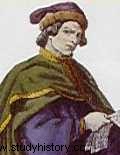 French trader. His fortune, built on speculation in precious metals and trade with the Levant, enabled him to become Charles VII's banker. Appointed king's treasurer (1440), invested with import diplomatic missions, he cleaned up the monetary situation, financed the reconquest of the kingdom, while increasing his personal fortune. He was arrested in 1451 on the charge (which turned out to be unfounded) of having had Agnès Sorel (the king's mistress) poisoned, then was kept in prison for embezzlement. He will end his adventurous life like in a swashbuckling novel. He escapes from his prison, joins Rome and the Pope, charters a fleet in the name of his illustrious host, and goes to fight the infidels. He died in 1456, probably during a naval battle with the Turks. Louis XI rehabilitated his memory.
French trader. His fortune, built on speculation in precious metals and trade with the Levant, enabled him to become Charles VII's banker. Appointed king's treasurer (1440), invested with import diplomatic missions, he cleaned up the monetary situation, financed the reconquest of the kingdom, while increasing his personal fortune. He was arrested in 1451 on the charge (which turned out to be unfounded) of having had Agnès Sorel (the king's mistress) poisoned, then was kept in prison for embezzlement. He will end his adventurous life like in a swashbuckling novel. He escapes from his prison, joins Rome and the Pope, charters a fleet in the name of his illustrious host, and goes to fight the infidels. He died in 1456, probably during a naval battle with the Turks. Louis XI rehabilitated his memory.
Grandson of Louis XV, Charles X, then Count of Artois, had to leave the country after the storming of the Bastille. During his emigration to England, he took part in the counter-revolutionary struggle and tried to unite the European emigrant forces against the French revolutionary regime. Recognize
